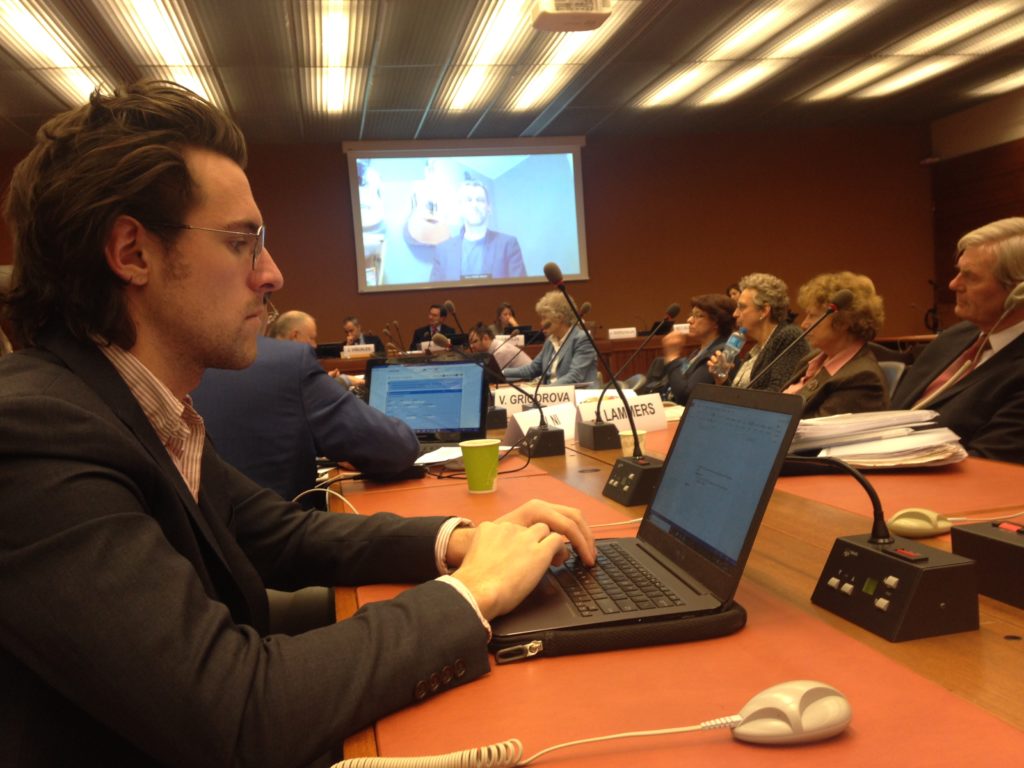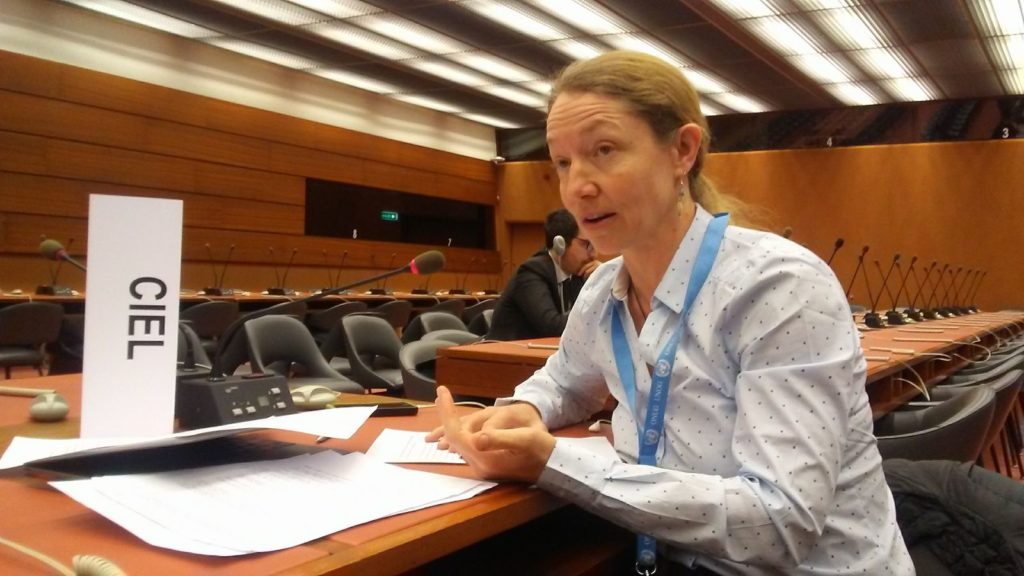What role can NGOs play in the enforcement of environmental treaties? How can compliance and implementation bodies encourage civil society participation in their reviews? What, if any, is the value of involving members of the public in the process?
These are some of the questions presented at a roundtable discussion of compliance committee representatives at the Palais des Nations in Geneva, Switzerland, on March 7, 2018. Representatives from four international environmental treaty bodies – the Aarhus Convention, the Water Convention, the Protocol on Water and Health, and the Basel Convention – convened to discuss their experiences with NGO participation in the mechanisms that monitor implementation of and compliance with their respective treaties.
The answers to these questions, of course, vary by treaty and by compliance committee. Some treaties – notably the Aarhus Convention – openly welcome public participation and explicitly allow the public to bring allegations of noncompliance (called “communications”) directly against Party States. Others, such as the Basel Convention, are less clear as to the role of civil society in monitoring and ensuring compliance.
At the roundtable discussion, representatives of the four treaties’ compliance bodies explored their differences, similarities, and best practices with regard to civil society engagement. Public participation was lauded as an admirable goal by all present, but the discussion revealed major gaps in procedure and philosophy among the compliance committees.

The Compliance Mechanisms
Aarhus Convention
The Aarhus Convention Compliance Committee (“ACCC”) is one of the most transparent and inclusive compliance mechanisms in the world. Established at the first Aarhus Meeting of the Parties (“MoP”) in 2002, the ACCC is composed of nine independent experts. The Committee accepts communications directly from the public, welcomes civil society participation in the review process, and publishes all of its findings and communications with the Parties online. ACCC is also remarkably active: in the first fifteen years of the Committee’s existence, the body has heard nearly 150 communications from the public, as well as Party submissions and requests for action from the MoP.
Protocol on Water and Health
The Protocol on Water and Health Compliance Committee (“PWHCC”) similarly accepts communications from members of the public and publishes its dockets online. However, PWHCC is much less active than its Aarhus counterpart: In the eleven years of its existence, the Committee has published just one communication from the public (submitted by our friends at Earthjustice) and one Committee initiative. At the meeting, the Chair of the PWHCCC, Professor Jorge E. Viñuales, expressed his disappointment at the lack of civil society engagement with respect to compliance. He postulated that the reason may be that PWH falls “between the cracks” of environmental law and human rights law, and that NGOs primarily concerned with one or the other might be hesitant to engage with the treaty.
Water Convention
The Water Convention Implementation Committee (“WCIC”), established in 2012, is the youngest of the four compliance mechanisms. WCIC offers a more limited participatory role to civil society organizations and members of the public than its Aarhus and PWH counterparts. The Committee does not accept communications from the public; only Parties or the WCIC itself may initiate a review of implementation and compliance. However, WCIC accepts submissions of information from the public encouraging WCIC to initiate its own compliance review, and information-providing NGOs are offered a seat at the table of the proceedings should the Committee decide to act on the submission.
Basel Convention
The Basel Convention Implementation & Compliance Committee (“BCICC”) is the least transparent of the four compliance mechanisms reviewed here. BCICC does not accept public communications, its proceedings are closed to the public unless the parties agree otherwise, and it does not publish its findings online. CIEL has commented before on the shortcomings of the compliance mechanisms of the Basel Convention and its sister treaties.
CIEL’s Intervention
Layla Hughes, Senior Attorney at CIEL, delivered an intervention at the roundtable stressing the importance of including a public trigger in treaty compliance mechanisms. She likened public triggers of international treaty compliance review to the “private attorneys general” approach of law enforcement adopted in some domestic legal systems, in which private parties are able to bring a lawsuit in the public interest when government lawyers cannot or will not do so themselves.

Further, in order to facilitate civil society participation in compliance reviews, it is essential to provide practical guidance for bringing public communications and have open proceedings that allow NGOs to familiarize themselves with review procedures. Financial support from governments can be equally important. Without these measures, NGOs will continue to face obstacles to participation, even if avenues are procedurally available.
CIEL has played an active role in the discussions to create the compliance mechanisms of the Rotterdam and Stockholm Conventions. However, unreceptive states have frustrated attempts to create compliance and implementation mechanisms for both Conventions, and progress with respect to those two treaties has been disappointing.
Conclusion
The roundtable discussion demonstrated that the value of public participation in treaty compliance is widely recognized among members of treaties’ compliance committees. Nevertheless, serious gaps exist among treaty mechanisms. Strengthening avenues of civil society participation through public communications, transparent proceedings, practical guidance, and focused outreach should remain a priority for treaty compliance bodies.
By Reed McCalib, Geneva-based intern

